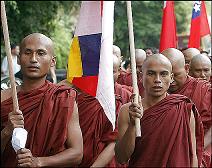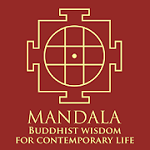
|
|
|
Home Asia Pacific South East Asia Myanmar Myanmar Protest News A Modern Buddhist Uprising Strikes a Quieter ChordBy RICHARD BERNSTEIN, New York Times, November 4, 2007New York, USA -- In this country, no doubt like in others, news about demonstrating monks in Myanmar has been reduced to a trickle, though here and there word leaks out of additional protests against military rule, and these reports find their way into the back pages of the newspapers.  But even at a trickle, that news ought to stir deep feelings in the United States, whose experience of Buddhist uprisings in Southeast Asia is rich, bitter and instructive. But even at a trickle, that news ought to stir deep feelings in the United States, whose experience of Buddhist uprisings in Southeast Asia is rich, bitter and instructive.I'm talking, of course, about the memory of Buddhist uprisings in South Vietnam that the Buddhist uprising in Myanmar inspires, the uprisings of the 1960s that powerfully unsettled public opinion and profoundly altered the politics of Vietnam. There's a lesson in the comparison between these two Buddhist entries into politics, and it's not just about the politics of democracy in a dictatorship. The lesson resides in the fact that the news from Myanmar, which used to be called Burma, has been reduced to the aforementioned trickle, while, 40 and more years ago, the news from Vietnam exploded day after day in the headlines, thereby stirring the conscience of the world. The paradox is that protests are most effective in those places where there is actually less to protest about, and less effective where repression is so powerful that protest, especially the peaceful variety, has little effect. Anybody old enough to remember the Vietnam War will remember that day in 1963: it was June 11 when newspapers around the world carried the shocking image of a 73 year-old monk named Thich Quang Duc sitting in the middle of a Saigon street and maintaining his rigidly erect lotus position even while his body was engulfed in flames. It was an image that changed the United States and Vietnam forever, a stunning, shocking and, in its way, sublime protest against the heavy-handedness and tyrannical capriciousness of the regime led by Ngo Dinh Diem being supported with the blood of young American men. Among its consequences was the American decision a few months later to engineer a coup leading to Diem's assassination, though the Buddhists continued to protest against later regimes as well, contributing to those governments·weakness and instability. A self-immolation that nobody knew about would have no effect, of course, but in South Vietnam a young American reporter for The Associated Press, Malcolm Browne, was on the scene that day, snapping away with the camera he always carried with him, winning a Pulitzer Prize and changing the course of history. We know from William Prochnau's excellent book of 1995, Since Upon a Distant War,·that Mr. Browne was present at that historic moment because he had been tipped off in advance by the Buddhists·clever and skillful press relations representative. There have been, as far as we know, no self-immolations in Myanmar during the recent round of protests there, but what if there had been? Maybe there would have been photos of it, as there were of some other events, notably the killing by the army of a Japanese photographer, Kenji Nagai, that was flashed around the world on the Internet. But no latter-day Malcolm Browne was in Myanmar during the recent protests, and that's because the ruling junta has long barred most reporters from entering the country, even when conditions are more or less normal. The shooting of Mr. Nagai, in this sense, had both a symbolic and practical importance. Moreover, after a few days, during which amateur photographers were able to put images of the Buddhist protest on the Web, the junta simply turning off the Internet. Since then there have been no more photos, and very little news. In other words, Myanmar's dictators quickly learned the lesson of the hazards of openness, and it's a lesson whose importance is demonstrated over and over again. In his essay on Gandhi, George Orwell argued strenuously against Gandhi's contention that his method of nonviolent resistance would be effective everyplace, including in Stalin's Soviet Union and Hitler's Germany. Operating brilliantly and bravely in the British context, trailed by reporters wherever he went, photographed by Margaret Bourke-White, Gandhi was able to move the British public, so that every time the government put him in prison, he gained a million more sympathizers in London and Liverpool. But as Orwell pointed out, had there been a Soviet Gandhi, he would have been shot in the basement of Moscow's Lubyanka prison long before anybody in the outside world had heard of him. The important point here is not so much that the British treated him forbearingly as that he was always able to command publicity, Orwell wrote. Gandhi believed in arousing the world, which is only possible if the world gets a chance to hear what you are doing. The first thing a dictatorship does therefore is try to prevent the world from having that chance, though it doesn't always succeed. When China, for example, opened up economically, it had to allow journalists into the country, and it paid a price for that when thousands of reporters were on hand to witness the crackdown on the Tiananmen protest movement in 1989. But China still systematically prevents journalists from doing first-hand reporting in Tibet, with the result that its own repression of Buddhists there took place and takes place largely hidden from outside view. In a way this is an argument in favor of engagement with dictatorships, since shunning them in a way plays into their hands. It makes it so much easier for them to keep their dirty deeds secret. And that's the difference between the Buddhist protests of four decades ago in Vietnam and those in Myanmar today. For Diem, tyrannical as he was, the presence of American reporters on June 11, 1963, was the price he paid for the American protection he needed, and, try as he did, he wasn't able to keep anything under wraps for very long. The junta in Myanmar understands that all too well. |
 Get your Korean Buddhist News here, brought to you by BTN-Buddhist Channel |
 |
 The Mandala app brings together Buddhist wisdom and meditation techniques with the latest insights of psychology and neuroscience to handle the challenges and complexities of modern life. The App offers a series of engaging talks and conversations with experts on a wide variety of topics, such as managing stress, dealing with adversity, developing greater resilience, cultivating empathy and compassion, creating healthy relationships, and many more. These topics are explored to help find greater peace, meaning and joy in our lives. Our panel of experts include Dr, Thupten Jinpa, Daniel Goleman, Kelly McGonigal and others.FREE DOWNLOAD here |
| Point
your feed reader to this location |
| Submit an Article |
| Write to the Editor |

